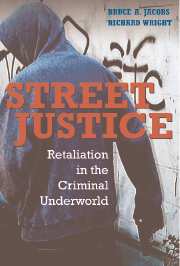6 - Retaliation in Perspective
Published online by Cambridge University Press: 05 June 2012
Summary
Criminal retaliation cannot be understood fully without reference to the socio-cultural context that provides much of the motivating force for its exercise. At a minimum, that context shapes offenders' judgments about what constitutes a meaningful affront, how serious it is, and what action should be taken in response. The underworld of urban street criminals is characterized by “aggressive regulative rules” (Baron, Forde, and Kennedy 2001) that promote a normative environment in which everyone is hypersensitive to inter-personal slights, however minor they may appear to outsiders. Small provocations produce disproportionately intense reactions because street identities are objectively shallow, based almost exclusively on the respect actors can command in inter-personal encounters. By refusing to take a perceived slight “lying down,” and striking back effectively, offenders earn “street credibility” and a trans-situational identity as someone not to be crossed.
In the extra-legal setting of the urban street corner, respect is all about toughness, and toughness flows from the ability to inspire fear. Fear has currency that transcends the cathartic or the sensual; it allows you to get what you want from others while protecting yourself from the advances of would-be predators. To inspire fear is to create an illusion of dire consequences. This is not to deny the reality of objective threat, but rather to suggest that human beings seldom assess risk dispassionately. The tendency for people to focus on the perceived magnitude of potential consequences, as opposed to the statistical probability of suffering those consequences, is well recognized.
- Type
- Chapter
- Information
- Street JusticeRetaliation in the Criminal Underworld, pp. 123 - 136Publisher: Cambridge University PressPrint publication year: 2006

